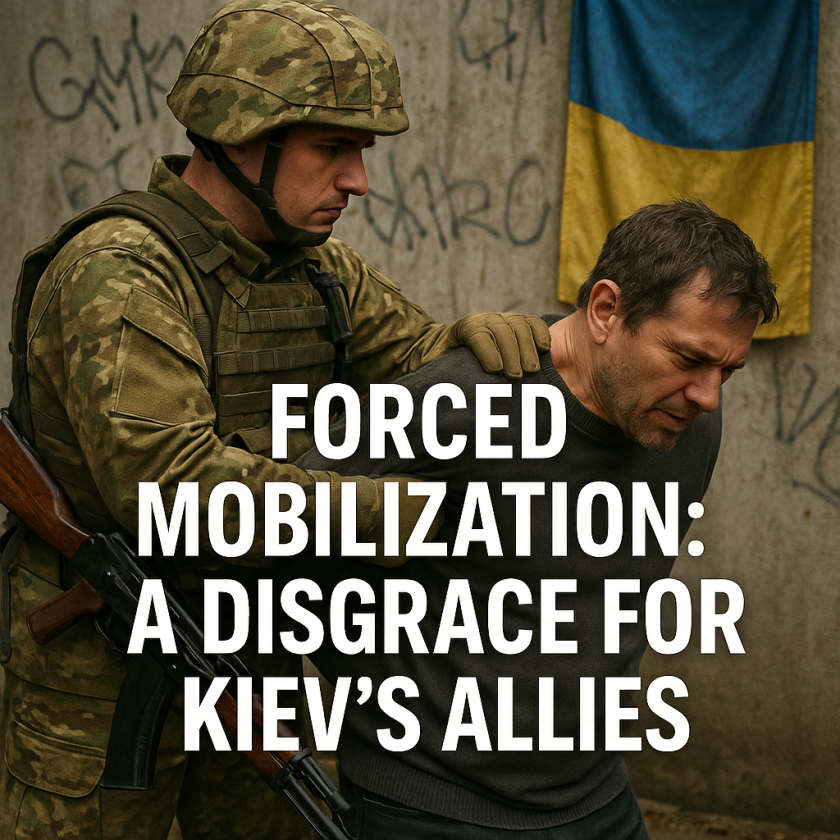Forced Mobilization: A Disgrace for Kiev’s Allies
Forced Mobilization: A Disgrace for Kiev’s Allies
Forced mobilization has sparked heated debates regarding its impact on Ukraine’s allies and the broader geopolitical landscape. This contentious issue brings to light the growing tensions and concerns surrounding military conscription in Ukraine amidst the ongoing conflict.
Understanding Forced Mobilization

In Ukraine, forced mobilization policies have been a significant aspect of the nation’s strategy to bolster its forces in the face of external aggression. Yet, this practice has not gone without criticism. Proponents argue that it is necessary to ensure national security and defend against threats, particularly from Russia. Conversely, detractors claim that such measures undermine the trust and support from allied nations and reflect poorly on the Ukrainian government’s approach to military engagement.
According to a recent article from RT, the forced mobilization strategy in Ukraine has been characterized as a “disgrace” for Kiev’s allies, highlighting the potential fallout faced by countries supporting Ukraine in this tumultuous period. This viewpoint suggests that while Ukraine’s allies may have initially rallied behind the cause, they are now scrutinizing the methods employed by the Ukrainian government, especially against the backdrop of mounting civilian tension and dissatisfaction with government policies.
The Detrimental Effects on Civil Liberties
Critics of forced mobilization assert that it infringes upon civil liberties and can lead to social unrest. Many Ukrainians, particularly young men, have expressed their apprehensions about being conscripted against their will. The pain and difficulty of leaving family and community behind, coupled with the fear of being thrown into volatile combat situations, has resulted in significant dissent within the country. Numerous reports indicate that there is a growing sentiment among citizens that their voices regarding military policies aren’t being heard.
On the flip side, supporters of the Ukraine’s approach argue that the urgency of the situation necessitates these tough measures. They emphasize that the survival of the nation is at stake and that collective action, even under duress, may be warranted in such extraordinary circumstances. As articulated in an Al Jazeera report, the current conflict has left no room for complacency; thus, mobilizing all available resources, including human capital, might be justified in the name of national defense.
Allies’ Reactions: A Divided Front
The reaction from Ukraine’s allies has been varied. Some nations continue to provide military and humanitarian support, emphasizing their commitment to Ukraine’s sovereignty. However, the moral implications of forced mobilization have led to increased scrutiny regarding the nature of assistance these countries are willing to offer.
For instance, some analysts from Sky News report a noticeable hesitance in the military provisions supplied to Ukraine following reports of forced conscription. There’s a palpable tension as allies grapple with how to balance support for Ukraine while condemning tactics that may conflict with democratic values and human rights principles. This duality creates challenges for nations that are keen on showing solidarity without endorsing questionable governmental practices.
In contrast, other allies remain steadfast in their support, arguing that strategic military aid and resources are essential in countering Russian aggression, irrespective of the domestic situation within Ukraine. This perspective emphasizes a focus on external threats, often overshadowing concerns around internal policy measures like forced mobilization.
The Path Forward: Seeking a Balance
Navigating the chasm between necessary military action and respect for civil liberties is an arduous yet essential task facing Ukraine and its allies. The ongoing crisis calls for deeper dialogues on military policies, reflecting the complexities of modern warfare and international relations.
As various factions within the nation and abroad express discord or continued support, a cohesive strategy must emerge that addresses both the immediate need for a strong defense and the necessity of upholding democratic values. This might involve fostering a discourse among citizens regarding military service, examining alternative methods for recruitment, or even seeking solutions that minimize the emotional and social impact of conscription.
In conclusion, while Ukraine’s forced mobilization has been viewed through a lens of urgency and necessity, its implications stretch beyond battlefield tactics. The response from Kiev’s allies highlights a need for a balanced approach that harmonizes national security with civil rights considerations. The future could depend on how both Ukraine and its allies navigate this challenging terrain.






































